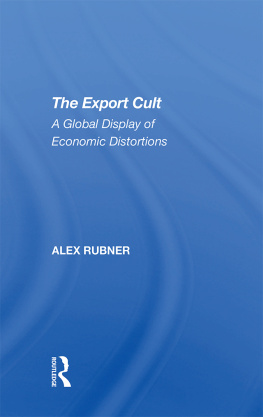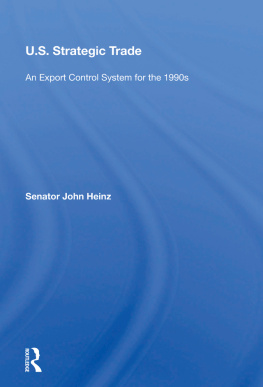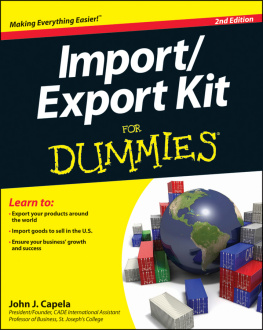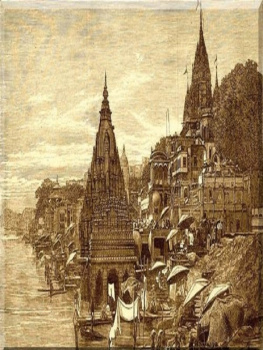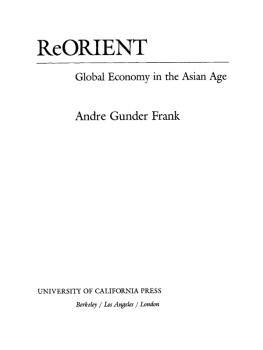Alex Rubner - The Export Cult: A Global Display of Economic Distortions
Here you can read online Alex Rubner - The Export Cult: A Global Display of Economic Distortions full text of the book (entire story) in english for free. Download pdf and epub, get meaning, cover and reviews about this ebook. year: 1987, publisher: Gower, genre: Politics. Description of the work, (preface) as well as reviews are available. Best literature library LitArk.com created for fans of good reading and offers a wide selection of genres:
Romance novel
Science fiction
Adventure
Detective
Science
History
Home and family
Prose
Art
Politics
Computer
Non-fiction
Religion
Business
Children
Humor
Choose a favorite category and find really read worthwhile books. Enjoy immersion in the world of imagination, feel the emotions of the characters or learn something new for yourself, make an fascinating discovery.
- Book:The Export Cult: A Global Display of Economic Distortions
- Author:
- Publisher:Gower
- Genre:
- Year:1987
- Rating:3 / 5
- Favourites:Add to favourites
- Your mark:
- 60
- 1
- 2
- 3
- 4
- 5
The Export Cult: A Global Display of Economic Distortions: summary, description and annotation
We offer to read an annotation, description, summary or preface (depends on what the author of the book "The Export Cult: A Global Display of Economic Distortions" wrote himself). If you haven't found the necessary information about the book — write in the comments, we will try to find it.
Alex Rubner: author's other books
Who wrote The Export Cult: A Global Display of Economic Distortions? Find out the surname, the name of the author of the book and a list of all author's works by series.
The Export Cult: A Global Display of Economic Distortions — read online for free the complete book (whole text) full work
Below is the text of the book, divided by pages. System saving the place of the last page read, allows you to conveniently read the book "The Export Cult: A Global Display of Economic Distortions" online for free, without having to search again every time where you left off. Put a bookmark, and you can go to the page where you finished reading at any time.
Font size:
Interval:
Bookmark:

52 Vanderbilt Avenue, New York, NY 10017
2 Park Square, Milton Park, Abingdon, Oxon OX14 4RN
Product or corporate names may be trademarks or registered trademarks, and are used only for identification and explanation without intent to infringe.
- BoP Balance of Payments
- COMECON Council for Mutual Economic Assistance - CMEA (Moscow: USSR plus allied European states plus Mongolia, Cuba and Vietnam)
- CT Countertrade
- DIY Do-it-yourself (self-service)
- DOLLAR US Currency. Also, outside the US, a symbol for all foreign currencies
- ECGD Export Credits Guarantee Department (UK state agency)
- EEC European Economic Community (Brussels)
- EXIMBANK Export-Import Bank (Washington - US state agency)
- GATT General Agreement on Tariffs and Trade (Geneva)
- GDP Gross domestic product
- IDA Industrial Development Authority (Dublin - Irish state agency)
- IMF International Monetary Fund (Washington)
- JETRO External Trade Organisation (Tokyo - Japanese state agency)
- LDC Less-developed country
- MITI Ministry of International Trade and Industry (Tokyo)
- MONC Monopolies and Mergers Commission (UK state agency)
- MULTI Multinational corporation
- NCB National Coal Board (UK state agency)
- NHS National Health Service (UK state agency)
- OECD Organisation for Economic Co-operation and Development (Paris)
- OPEC Organisation of Petroleum Exporting Countries (Vienna)
- PR Public Relations
- TOLISTAN An amalgam of several LDCs - definition on p. 54
- TUC Trades Union Congress (UK roof organisation of most national unions)
- UN United Nations (New York)
- UNCTAD United Nations Conference on Trade and Development (Geneva)
- VALAD Value-added (measured in foreign currency) - definition on pp. 55-7
- VAT Value-added tax
Font size:
Interval:
Bookmark:
Similar books «The Export Cult: A Global Display of Economic Distortions»
Look at similar books to The Export Cult: A Global Display of Economic Distortions. We have selected literature similar in name and meaning in the hope of providing readers with more options to find new, interesting, not yet read works.
Discussion, reviews of the book The Export Cult: A Global Display of Economic Distortions and just readers' own opinions. Leave your comments, write what you think about the work, its meaning or the main characters. Specify what exactly you liked and what you didn't like, and why you think so.

